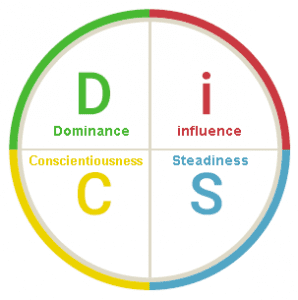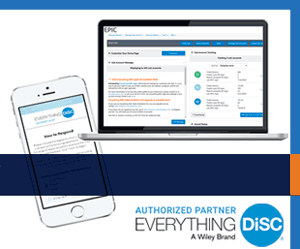
DiSC is a behavioral-based learning assessment that is offered in many forms. The DiSC Assessment helps people identify their DiSC personality type or style by completing a series of questions. Occasionally referred to as the DiSC Personality Profile, the assessment helps people:
- Understand their behavior style(s), also often called personality types.
- Discover how to adapt their behavior to improve communications.
- Learn about other DiSC personality types to help them understand why people do the things they do and why they think the way they think.
- Enhance their performance, and their team’s performance, through their newfound understanding and improved communications.
- Reduce conflict in their personal and work relationships.
This model focuses on four distinct DiSC personality types. The four distinct personality types are represented in the DiSC circular model pictured here.
Several DiSC-based assessments exist in the market today and their terminology varies from one flavor to the next. Most of these assessments use similar terms to identify the four personality types. Basically, the general theme is the same. However, the assessments and the corresponding reports vary a lot. Some DiSC personality types even use colors or animals to represent the four different personalities. I’ve never been a fan of the colors or the animals but they do appeal to some. These assessments are not all created equally but we’ll discuss the differences in another post.
What does the “D” style represent?
Someone with a “D”, or Dominance style, will be focused on achieving results and taking action quickly. We all know this personality type. It may be ourselves, a co-worker, or maybe even our boss. The word dominance is a perfect descriptor because D’s are often perceived as being dominant in the workplace and in their personal relationships. They’re motivated by competition, winning, and success.
Individuals having “D” DiSC personality types are typically direct and to the point. This means they would prefer you to be direct and to the point when you are communicating with them. Imagine how effective a salesperson would be if they adapted their communications to appeal to others. Adjusting tone, or even the number of words, can make communications much more appealing to the person on the receiving end.
If you haven’t noticed already, the dominance personality type, as with all of the DiSC personality types, has its drawbacks. People identifying with the “D” style often come across as having little or no concern for others. Sometimes they can appear impatient and insensitive. Often these people do not realize how they’re perceived. One of the benefits of learning about your DiSC personality type is recognizing the negative aspects of your own behaviors. Understanding their style can help D’s to slow down and be more sensitive to the people around them.
What does the “i” personality type represent?
The small “i” indicates the Influence style. People demonstrating the “i” type often express their enthusiasm openly and they’re usually very friendly people. You might refer to them as a “people-person”. Influencers prefer to act on things quickly and they inspire collaboration in the workplace. People identified with the Influence style enjoy talking and working closely with others. It’s important to them to be recognized socially, especially in the workplace. They put a premium on public recognition.
Things you may notice about someone with the “i” personality type:
- They often come across as charming.
- They show enthusiasm in most of the things they do.
- They’re often more optimistic than most.
- They can be talkative.
As with the “D” personality type, influencers also have their drawbacks. They can appear to be impulsive and disorganized. If they don’t take deliberate measures to stay organized, they have a tough time following through on tasks and projects. Often people with the “i” style do very well in sales positions. However, it’s important to note that the DiSC Personality Assessment is a tool to help people gain understanding. It’s not a perfect prediction model for success in a particular job. The assessment can certainly help provide that type of insight. Although it’s much more effective to use an assessment specifically designed for selecting and hiring employees.
What does the “S” DiSC personality type indicate?
The “S” stands for Steadiness. You can probably guess the characteristics of the “S” style. These people enjoy providing support and maintaining stability. A stable workplace environment is very important to people with the “S” personality type. As an employee, they prefer receiving feedback from their supervisor regularly. They’re also consistently looking for ways they can help others.
Individuals with the “S” personality type tend to be more concerned by change than most. If you think about it, that makes perfect sense considering they prefer stable situations and environments. They tend to shy away from conflict and may be overly sensitive to feedback. Maintaining harmony and keeping the peace is important for people who exhibit “S” style characteristics.
As with all of the four DiSC personality types, characteristics viewed as strengths can lead to negative perceptions from others. For instance, people exhibiting the “S” personality type are often viewed as over accommodating. Their desire for stability can make them resistant to change. The S’s will often avoid change altogether. They subscribe to the “if it isn’t broken don’t fix it” approach.
The “C” Personality Type
The “C” in the DiSC acronym stands for Conscientiousness. People with the conscientiousness personality type tend to place priority on accuracy, maintaining stability, and challenging assumptions. They are motivated by opportunities to use their expertise whether it’s at work or at home. People identifying with the “C” personality type desire activities where they can use their expertise to produce quality results.
Being wrong, being criticized, and working with slipshod projects are all fears for people possessing the “C” style. They place a premium on doing things the right way regardless of how long it takes. People with the “C” style often refer to themselves as perfectionists. They’re good at tasks that involve detailed analysis and precision but try not to ask them to do something that needs to be completed right away.
People often notice that C’s operate in a quiet and reserved manner. They prefer to work alone rather than working in a group. Occasionally they can come across as skeptical and overly critical. Sarcasm is a trait that can help you identify someone with the “C” personality type. Colleagues who possess the “C” style can appear as:
- Private
- Methodical
- Skeptical
- Precise
Since they place a high level of importance on ensuring accuracy, C’s can tend to overanalyze. Recognizing this potential problem will help people with the “C” style avoid being bottlenecks within an organization.
Learn More About DiSC
DiSC is an assessment model that has been used by individuals and corporations for 40+ years. As people begin to understand their personality type they also begin to recognize other people’s DiSC personality types. This knowledge helps them grow professionally and personally. It improves their ability to communicate and makes them much better at working with others. Relationships improve and they become more effective in their careers. It’s an interesting and amazing transformation.
Discover your DiSC Personality Type
“DiSC” is a registered trademark of John Wiley & Sons, Inc.




